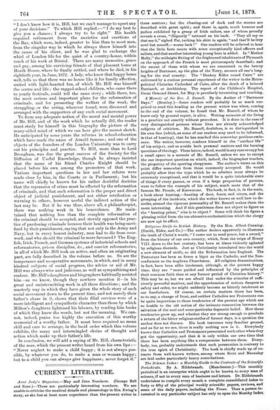Religious Strife in British History. By the Hon. Albert Canning.
(Smith, Elder, and Co.)—The author desires apparently to illustrate the truth of Christ's words, "I came not to send peace, but a sword," from the history of our own country, which, from the reign of Henry VIII. down to the last century, has been at times violently- agitated by-religious discords. Just as Christianity introduced into the world a new element of strife, so did the Reformation into England. The Protestant has been as fierce a bigot as the Catholic, and the Non- conformist as the Anglican Churchman. All religious denominations, in fact, bare been alike intolerant, although, at the present happy time, they are "more guided and influenced by the principles of their common faith than at any former period of Christian history." This may be so, but we are afraid that under the stimulus of suffi- ciently powerful motives, and the apprehension of serious dangers to safety and order, we might suddenly become as bitterly intolerant as our forefathers. Of course, on certain matters there has been, so to say, a change of front, and neither Catholics nor Protestants can be quite impervious to those tendencies of the present age which are so hostile to the old notion of the intimate connection between the salvation of the soul and some particular dogmatic belief. How these tendencies grow up, and whether they are strong enough to preclude a return of the bitter religious strifes of former days, is a question the author does not discuss. His book traverses very familiar ground, and as far as we see, there is really nothing new in it. Everybody knows that Catholics and Protestants persecuted each other when they got the opportunity, and that it is only within our own time that there has been anything like a compromise between them. Every. body, too, probably understands that such persecution is contrary to the true spirit of Christianity. The book is chiefly made up of ex- tracts from well-known writers, among whom Scott and Macaulay are laid under particularly heavy contributions.


































 Previous page
Previous page